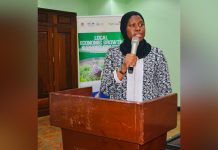Africa-Press – Uganda. Uganda has validated climate vulnerability maps that will guide evidence-based adaptation planning in the agricultural sector, strengthening the country’s response to climate shocks.
The validation took place during a two-day national workshop held from October 22–23, 2025 in Entebbe, organized by AGRA in partnership with Mathematica Global. The high-resolution vulnerability mapping covers Uganda, Kenya, Tanzania, Zambia, and Ghana, providing critical data to inform climate-smart investments and policy decisions.
Mr. David Wozemba, AGRA Uganda Country Director, said the exercise demonstrates “how data-driven approaches can power Africa’s agricultural transformation.”
“AGRA’s mission is to transform Africa’s agricultural systems, and Uganda’s case reflects that same ambition — to build climate-resilient farming systems that can adapt, recover, and thrive amid environmental change,” Wozemba said.
He noted that AGRA’s work in Uganda focuses on strengthening seed systems, regenerative agriculture, irrigation, and mechanization, all aimed at improving farmer resilience to climate shocks.
“Sustainable farming cannot be achieved without resilience at all levels, from farmers to institutions,” he added.
Speaking at the closing of the workshop, Dr. Paul Mwambu, Commissioner for Crop Inspection and Certification, Ministry of Agriculture, Animal Industry and Fisheries (MAAIF), said the mapping provides “a scientific compass” for guiding Uganda’s climate response.
“This is not an abstract exercise; it is an evidence-based compass that helps us anticipate risks, prioritise resources, and design interventions that protect yields and livelihoods,” Mwambu noted.
He added that the findings will help planners identify the most exposed farming systems and guide climate-smart investments at both national and district levels.
“When we anticipate, we prepare better. Climate vulnerability mapping allows us to identify where our communities are most exposed and where adaptation investments will have the greatest impact,” he said.
Mr. Dan Bunter, Senior Consultant at Mathematica and Project Manager for the study, said the mapping process goes beyond technical modelling to include local validation and stakeholder ownership.
“Our approach combines global data with local expertise,” Bunter said. “The discussions we’ve had with Ugandan scientists, policymakers, and extension officers have ensured that the maps are not just accurate — they are useful for real-world decisions.”
He emphasised that the findings “belong to Uganda” and should guide investment priorities and policy design across the agriculture sector.
According to the study, Uganda’s eastern and northern maize belts are the most climate-vulnerable regions due to fragile soils, high exposure, and low adaptive capacity. Bean-growing zones in the western and eastern highlands face similar risks from landslides, erratic rainfall, and soil degradation.
By 2050, these areas are projected to experience more frequent droughts and temperature spikes, undermining yields and livelihoods. Meanwhile, western Uganda remains comparatively resilient due to stronger infrastructure, diversified production systems, and better market access.
Participants endorsed practical adaptation measures, including the promotion of drought-tolerant seeds, soil and water conservation, and digital weather advisories for farmers. New innovations such as index-based livestock insurance, climate-risk financing, and integrated rangeland management were also highlighted as critical for reducing vulnerability among smallholders.
Dr. Jeremiah Rogito, Climate Adaptation and Resilience Lead at AGRA, introduced an interactive data platform that allows users to visualise vulnerability trends, compare future scenarios, and generate district-level adaptation insights in real time.
The workshop concluded with a call for the validated findings to be integrated into Uganda’s National Adaptation Plan for Agriculture (NAP-Ag) and National Development Plan IV, ensuring that policies and investments are evidence-led and locally grounded.
“Transformation happens through partnership, dialogue, and shared commitment,” Wozemba said in closing. “With tools like these, we can move from awareness to action and build a climate-resilient Uganda.”
For More News And Analysis About Uganda Follow Africa-Press






